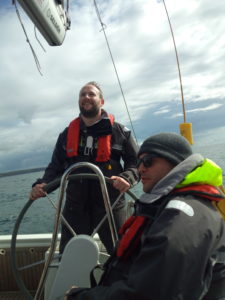By which we mean, how can I get in to sailing yachts?
We deal with hundreds of clients on board every year and many, many of them will ask a question along the lines of
- how do I get to skipper a yacht like this?
- how do you start to sail?
- can anyone learn to sail a yacht like this?
This post hopefully will answer some of these questions.
Where to start?
Firstly it is important to understand that getting in to sailing and getting in to yachting are likely to be different things. Sailing is a skill that is developed by direct exposure to multiple types of craft and especially what English speakers call sailing dinghies. Though it is possible to develop wind awareness and an understanding of sail trim in a cruising yacht most experienced sailors will say that the best learning environment for sailing is in a small boat where every manoeuvre and evolution matters. So, if you really want to start at the beginning you would probably be best advised to look into the RYA dinghy sailing programmes run by many sailing clubs and sailing schools around the UK. The great thing here is that dinghy sailing is not an activity which requires the sea – there are clubs on lakes and reservoirs, rivers and estuaries as well as the coast.
 How to start yachting
How to start yachting
If, however, your dream is to be on a 40′ yacht anchored somewhere in the Caribbean or the Greek islands, what you are really asking is ‘how do I get in to yachting?’ A sailing yacht can be really quite small – not much bigger than a sailing dinghy – but differs because it has a keel of some sort. This means that most yachting is done ‘on the high seas’ – that is, around the coast, in the Med, or further offshore. So a bit of time will probably need to be allocated in order to build up experience. The usual route in the UK would be to work through the RYA’s Cruising Scheme starting with Competent Crew, then Day Skipper and perhaps all the way to Yachtmaster. The scheme is offered at many sea schools dotted around the coast, with many in our area of the Solent. It pays to take some time over your research because the experience you can have on one of the courses can vary considerably. Before plumping for the cheapest course available consider the following:
- Are the dates offered genuinely convenient? Do you have to do a 5 day course or can it be done over 2 weekends?
- What time of year/ season will it be? Yachts are usually very cold in Feb and March because of the low water temperature. An autumn course can be stormy; a summer course is often compromised by very busy marinas and a night hours sail in the early hours of the morning. A Bank Holiday weekend in the Solent is going to be extremely busy.
- How many students are typically on the boat? 5 students on board is common which means shared cabins and/ or students sleeping in the saloon with little privacy. Some schools will promise individual cabins, at a price.
- What is the likely make-up of the crew in terms of the courses they are following? A boat load of Comp Crews is unusual so a novice will often be paired with students following Day Skipper or even Yachtmaster prep. If you are doing Day Skipper beware of being paired with a boat full of other Day Skippers – you will get significantly less practice of all the skills and evolutions.
- Are all meals catered for on board and included in the course cost? Or are students encouraged to eat ashore in the evening at their own expense? A cheaper course could work out much more expensively if Michelin starred dinners are enjoyed every evening.
- Are there any other costs – mooring fees, for example – which the students have to cover or is the price genuinely ‘all in’? Some schools will ask for a daily contribution from all students on board to cover extras, or students have to sort out paying for things between themselves.
- Most controversially probably – where is the sea school located and what cruising grounds does it have access to? What sort of experience will these cruising grounds offer? The RYA has abandoned tidal vs. non-tidal qualifications but that does not mean that a school in the Ionian can replicate the experience of manoeuvring a yacht in a crowded marina with a strong tidal set going through it, such as in the Solent. Similarly, a school located in the Medway will not be able to offer guaranteed sunshine and al fresco meals in a beach side restaurant.
What’s next?
There are many stages to the journey of becoming a yacht skipper and taking courses is only part of it. A Competent Crew course will show a novice what it is like to live on board a sailing yacht and how to be ‘useful’ on deck. However, these skills and experiences can be developed under the wing of a sympathetic, knowledgeable skipper. On the other hand, it is definitely not possible to become a safe and competent skipper without formal training. Most individuals understand this instinctively because being on board a sailing yacht is a pretty alien environment – but there are some lunatics who go out and buy a boat without any experience or knowledge.
Having had some expert training it is vital that the aspiring yachtsman or skipper goes sailing regularly. It is all too easy to allow skills to atrophy and to forget important knowledge – whether it is how to tie the bowline knot or recognise the lights of a fishing boat trawling its nets at night. The desire to go sailing often clashes with the realities of day-to-day life so one good idea is to turn your hobby into a holiday: look into chartering a yacht, either as part of a flotilla, or to take it on a bareboat basis. This does not have to be a scary prospect since there are numerous cruising grounds where an inexperienced skipper and crew can find their feet. These include the Ionian islands in Greece, the area around Gocek in Turkey, or amongst the Croatian islands. What is more, family and friends will remember the holiday for ever – hopefully for the right reasons! – and be very grateful for being allowed along.
Going further
Other ideas for expanding your sailing experience include:
- Join a club and sign up for crewing opportunities – not all clubs are frighteningly expensive.
- Look out for crewing opportunities on a yacht that goes racing – keep an eye on club/ regatta websites or be brave and walk the dock early on a racing day.
- Sign up for a crewing website where delivery skippers go to find crew or with the yacht delivery companies themselves.
- Pay for trips and additional courses run by sea schools.
- Join a boat-share club where you get access to a yacht for a certain number of days a year and can get further training.
- Buy a boat, either individually or with others.

The great thing about sailing – whether it be on a yacht or in a dinghy – is that anyone can do it, at any age. That might sound naive, but sailing is genuinely a sport or past-time for everyone – young or old, male or female, fully able or living with disability. Why not give it a go?


 How to start yachting
How to start yachting